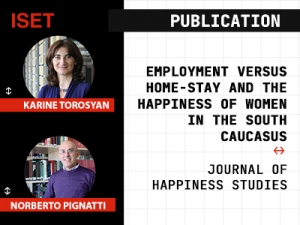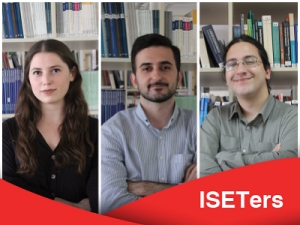ISET faculty’s Yet Another International Publication
A new paper written by Associate Professors Karine Torosyan and Norberto Pignatti has just been published in the Journal of Happiness Studies.
The paper, titled Employment Versus Home-Stay and the Happiness of Women in the South Caucasus, explores the happiness gap between housewives and working women in the South-Caucasus, assessing the potential role of cultural and ethnic effects as opposed to that of institutional factors.
The paper findings suggest that observed differences across the three South-Caucasus countries might be due more to differences in institutional factors than to cultural and ethnic differences.
Here is a link to the paper. An earlier – working paper – version of the paper can be found here.
Employment vs. homestay and the happiness of women in the South Caucasus
byKarine Torosyan Norberto Pignatti
Modern women often face an uneasy choice: dedicating their time to reproductive household work, or joining the workforce and spending time away from home and household duties. Both choices are associated with benefits, as well as non-trivial costs, and necessarily involve some trade-offs, influencing the general feeling of happiness women experience given their decision. The trade-offs are especially pronounced in traditional developing countries, where both the pressure for women to stay at home and the need to earn additional income are strong, making the choice even more controversial.
ISET hires three graduates, who will begin work in ISET Policy Institute
ISET is very proud of the fact that every single one of its students has walked into meaningful employment after graduation, but it is both pleasing and special when ISET graduates are hired to work for the institute itself. Their contributions and efforts help inspire the next generations, as well as continue to drive the ISET Policy Institute's research.
From September, the Policy Institute will be employing a further three ISETers, all of whom graduated as part of the Class of 2020. Among these is valedictorian Guram Lobzhanidze, who will now work as a Junior Researcher for the Energy and Environment Policy Research Center (EEPRC). Guram has a particularly diverse educational background, having attended university in both Georgia and China, and studied International Relations, Economics, and the Chinese language. Before beginning his role for Policy Institute, Guram taught first-year Master's degree students in both microeconomics and econometrics.
CONTACT US
16, Zandukeli St,
0108 Tbilisi,
Georgia
Telephone: (+995 32) 250 71 77
Email: info@iset.ge




